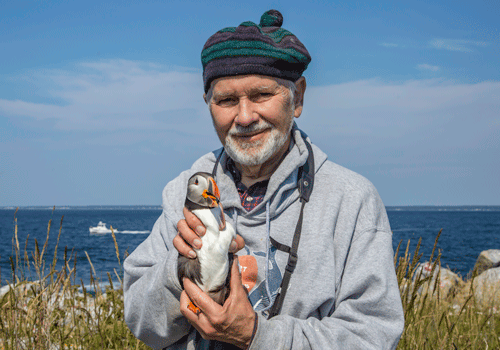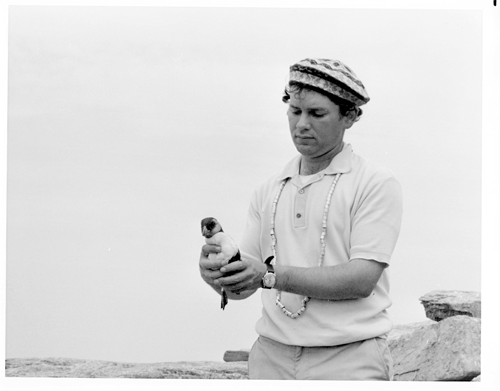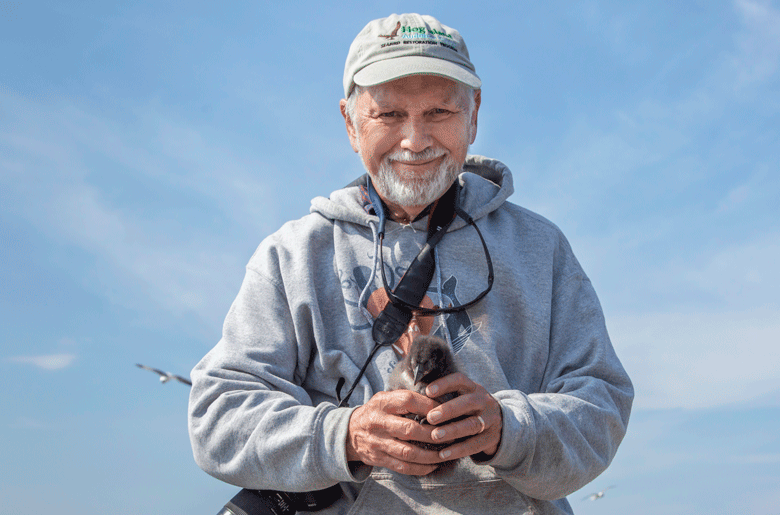Last fall, Dr. Steve Kress, PhD, received a lifetime achievement award from the Natural Resources Council of Maine. Kress, 77, has a long list of credits to his name, but undoubtedly he is best known for the work he spent much of his career doing: restoring and managing breeding populations of Atlantic puffins and other seabirds on Eastern Egg Rock, a small island six miles from New Harbor in Knox County.

Kress founded Project Puffin 50 years ago with six puffin chicks from Canada. The populations of nesting pairs vary year to year, but in 2017, for example, there were 172. The seabird restoration techniques that he and Project Puffin staff and volunteers established are now used in seabird restoration projects around the world. The Working Waterfront talked to him about his Lifetime Achievement Award, Project Puffin, and wildlife conservation.
The Working Waterfront: You retired from Project Puffin in 2019. What is your involvement now with it?
Kress: I don’t have any kind of formal arrangement, but I’m available to help in any way that people are interested in having my help. One thing that I continue to do is to teach at Hog Island [Audubon Camp]. I have two sessions coming up next summer, and I create online educational courses for the Hog Island Seabird Institute as well. And I’m writing up some research about seabirds. These are kinds of things that I enjoy doing and they seem to be still helpful.
WW: What are your thoughts on the evolving attitudes about wildlife conservation? It seems that people are more willing to champion particular animals, such as whales, but have no problem with letting other types of species go extinct.
Kress: It’s easier to identify with creatures similar to ourselves, and so even though a whale doesn’t look similar to us and lives in a foreign environment, we know that they are mammals. We know that they share all the mammalian traits and they are big and they are rare, and big and rare are very appealing things to humans. They leave us in awe.
“Being accountable for losing that other animal, causing its extinction, is a terrible thing.”
Whales leave us in awe. I think that losing something like that—even the thought of losing something like that—and being accountable for losing that other animal, causing its extinction, is a terrible thing. To know that they’re still with us gives us hope that we can actually make a difference here even if we never see one.
I think that those kinds of things drive people to care and to have opinions and to look for action that they might take so we don’t lose yet another species on our watch.
WW: The Project Puffin story is well-known; is there something about it that isn’t as well-known?
Kress: A question that I get less now than in the beginning is why bother to save a very common species and to invest in saving common animals? I think it remains a very important question. One of the things that seabirds have shown us is that populations of animals can disappear very rapidly and in huge numbers.
WW: I remember going to Popham Beach as a child and seeing piping plovers everywhere. Now it seems like a miracle when I see them.
Kress: That’s one of the success stories in Maine. But your memories of them being super abundant are really important because it’s hard to know when we have enough to back off of something. Certainly, when something is very common, often people aren’t paying attention to it.
WW: What are your hopes for Project Puffin going forward?
Kress: The interns on the islands have a dual role: one is to manage invasive plants and to have a presence that discourages predators from impacting the islands, and to clean up plastics and other kinds of things that wash up on the beach that aren’t good for the birds. The other role is to learn about the fisheries that are changing and learn about the effects of climate change on fish and birds. So, the interns who live on the islands now spend much of their time in these kinds of ongoing studies that are very informative about how the ocean, particularly the Gulf of Maine, is changing.

One of the very exciting things that’s changed since Project Puffin began is the technology for tracking animals. We didn’t even know where puffins went in the winter until recently. Now we are learning about where they are going.
What we do with that information is the bigger challenge that moves into political-economic decisions that people are going to have to make. It’s so exciting to see this sort of unveiling in front of our eyes and it just gets more and more amazing and more daunting because the places where they’re going are often the other ends of the world.
WW: It’s been a few weeks since you received the Lifetime Achievement Award. What are your thoughts about it?
Kress: I am very appreciative. It’s recognition that I think could help to inspire other people to do similar kinds of projects.





